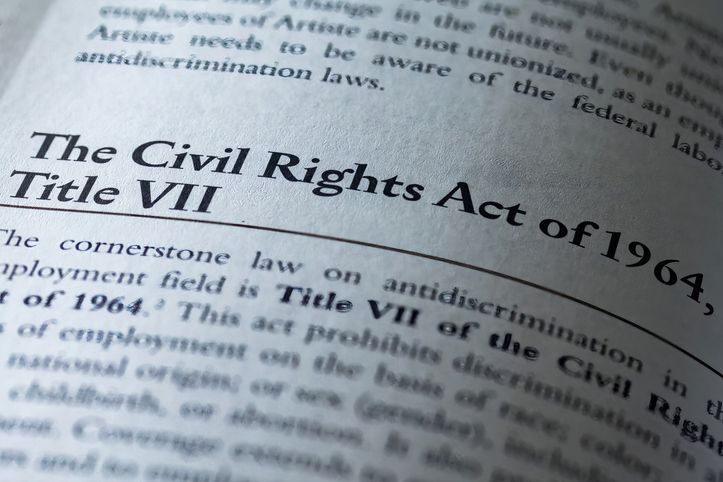Employers may recall that earlier this year, President Trump signed an Executive Order (EO) limiting the recognition of gender to male and female. Texas Governor Greg Abbott then passed a similar directive shortly after and has also signed a bill into law that could affect how employers should address their employees. However, employers shouldn’t neglect their obligations under federal case law and the protections afforded to their employees by Title VII of the Civil Rights Act of 1964.
Not to be Confused with Laws Directed at Federal and State Employers
Upon entering office on January 20, 2025, President Trump signed EO 14168, which directed all federal agencies and federal employees to, “enforce laws governing sex-based rights, protections, opportunities, and accommodations to protect men and women as biologically distinct sexes.” Ten days later, Governor Greg Abbott sent a letter to all state agencies requiring them to, “ensure that agency rules, internal policies, employment practices, and other actions comply with the law and the biological reality that there are only two sexes—male and female.”
Although both Trump’s EO and Abbott’s letter were addressed only to public employers, the directives align with the Trump administration’s agenda to suppress gender identity and transgender individuals from the employment sector.
Texas House Bill 229
In line with these efforts, Texas lawmakers passed House Bill (HB) 229, which defines “man” and “woman” based on an individual’s reproductive organs and bars state documents from recognizing gender identities that differ from an individual’s sex assigned at birth. The governor signed HB 229 into law on June 20, 2025, and it went into effect on September 1.
The new law makes clear that Texas’ state law will recognize only two sexes, male and female, and rejects nonbinary or gender-identity-based designations for all purposes, including state government data collection. The law will likely not only affect gender discrimination claims under the Texas Labor Code but also how employers should collect and share their employees’ demographic information.
Data Collection Under HB 229
Under HB 229, Texas establishes statewide definitions to apply across all Texas laws and provides that “a governmental entity that collects vital statistics information that identifies the sex of an individual for the purpose of complying with antidiscrimination laws or for the purpose of gathering public health, crime, economic, or other data shall identify each individual as either male or female.” While this new law doesn’t include any penalties for violations, it strengthens efforts across the state to mandate that government-issued documents, like birth certificates and driver’s licenses, reflect a person’s biological sex at birth.
The new law aligns with Governor Abbott’s earlier letter as well as President Trump’s EO. As a result, employers should be prepared for its impact on workplace operations and data collection.
Lessons from Buffalo Wild Wings
Following a second special legislative session, lawmakers also passed Senate Bill (SB) 8, which restricts which restrooms transgender people can use in government buildings and schools. SB 8 requires individuals to use the public restroom that corresponds to their sex assigned at birth.
Opponents of the bill raised practical concerns of how this bill should be enforced and pointed out how an individual’s looks—which may not conform to a retro 1960s idea of how a woman should look or dress—could lead to further harassment of women simply trying to pee at work or common areas.
There have already been instances of such harassment at a Buffalo Wild Wings in Minnesota, where a teenage girl alleges that a Buffalo Wild Wings employee followed her into the women’s restroom and demanded that she prove her sex as a woman. The teenage patron promptly filed a lawsuit against the establishment, claiming it made her unzip her hoodie to show she had breasts before she was allowed to use the restroom.
Similarly, employers may encounter instances where this rhetoric spills into their workforce. However, private employers should not fall victims into thinking women or gender-nonconforming individuals are unable to file claims against their employers for similar conduct. Outside of possible data collection requirements, the laws haven’t changed with respect to employees’ civil rights or their ability to pursue unlawful discrimination claims.
Gender Discrimination is Still a Thing
You shouldn’t conflate state requirements with federal requirements. When interacting with your employees, federal law still requires you to use their preferred pronouns and gender preferences. You should also continue to provide accommodations for intersex employees and ensure that no employees, managers, or supervisors are engaging in unlawful discrimination practices.
Under federal law, Title VII prohibits employers from discriminating against an employee based on their:
- Race
- Religion
- National origin
- Color
- Sex, including gender, gender identity, pregnancy, and sexual orientation
Employees may continue to file discrimination charges with the Equal Employment Opportunity Commission (EEOC) and pursue their claims in federal court. Further, you may continue to face liabilities in state court under federal case law and local ordinances, such as those in Dallas, Fort Worth, and Austin.
Ana Patricia Elizondo is an attorney with Monty & Ramirez, LLP, in Dallas, Texas, and can be reached at pelizondo@montyramirezlaw.com.




